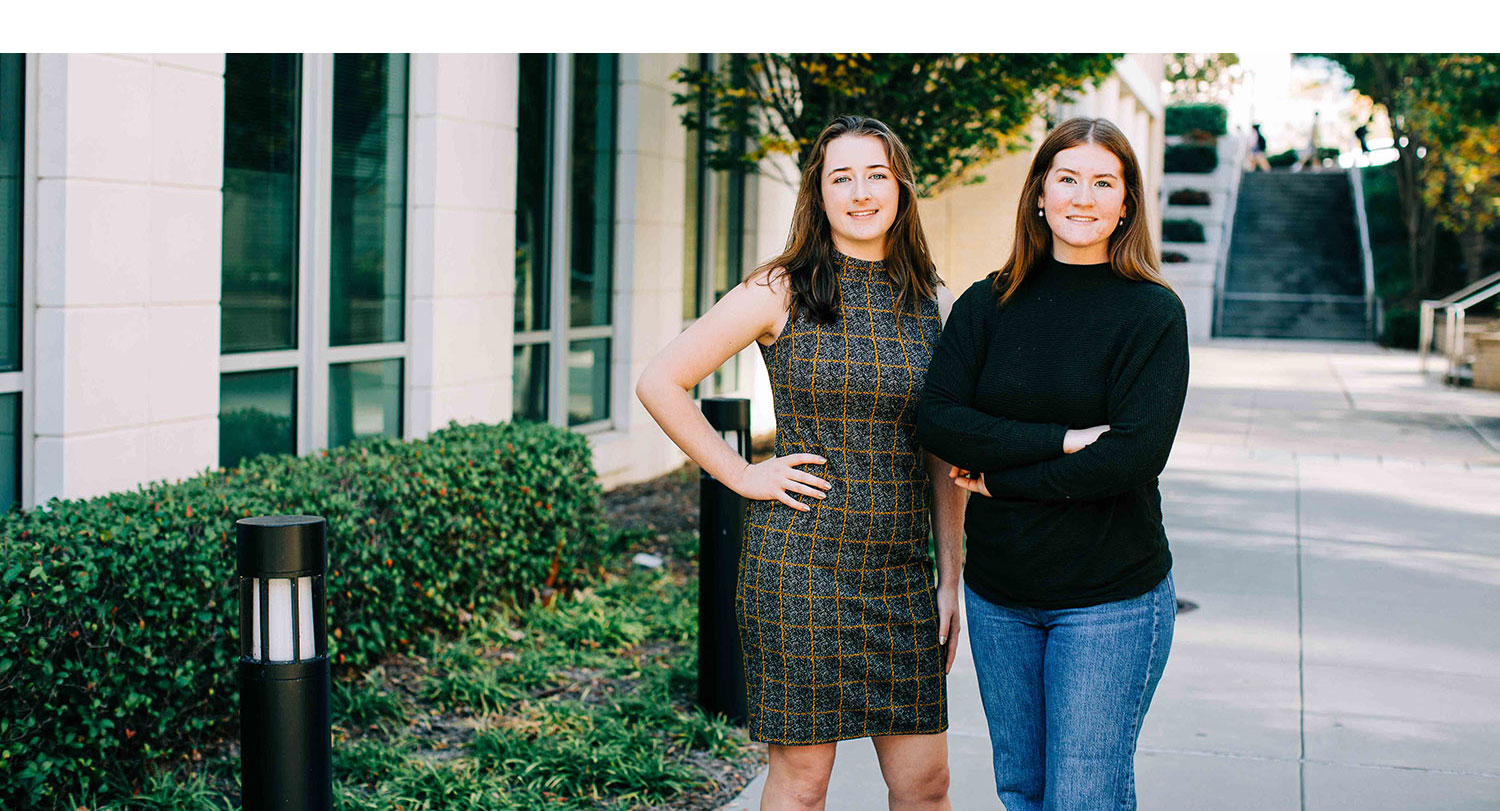
If you ask Emma McBride about the role that computers and technology have played in her life, she can’t answer fast enough.
“I grew up doing robotics through elementary, middle and high school,” says the senior South Carolina Honors College computer science major. “My dad was into technology, and so he would always be coming home with different computer parts, and he’d bring me and my sisters up to the office and be like, ‘All right, guys, look at this, what does this do?’”
For Madeleine McBride, sophomore Honors computer information systems student, her fascination with all things cyber developed upon her arrival to the University of South Carolina.
“I hated robotics. I hated computing,” she laughs. “I wanted nothing to do with it. It always felt like Emma’s and my dad’s turf. So I went into school for nursing, and then when I came here, they were talking about nursing informatics. I tried it out, and I would get into research here at a lab, and I loved it — and it finally felt like something I was good at.”
While their paths to the Molinaroli College of Engineering and Computing, and their specializations, unfolded differently, the McBride sisters share a common distinction: They both earned the Department of Defense Cyber Service Academy national fellowship. Together, they’re committed to protecting users’ data, exploring the evolving field of cybersecurity and investigating the legal and ethical developments that accompany technological advancements.
“I love the mystery of it all,” says Madeleine. “I feel like there’s so much left that we haven’t discovered, and I really like the idea of being able to track exactly what happened with concrete, digital footprint evidence. And that’s why I’m so drawn to digital forensics.”
“I just think it’s fascinating to see how different systems are built,” Emma adds, “and also because there’s a nerd rage in me, that sometimes when I see a system, I’m like, ‘Why did they do it this way?’ And I’m like, ‘I can fix this, and I can make it better,’ and I can do something that’s going to impact someone else, hopefully for the better.”
The DoD CSA supports the education and professional development of college students who are interested in cybersecurity. The scholarship portion provides full college tuition and fee coverage, and undergraduate scholars also receive a $29,000 stipend. While the McBride sisters appreciate the financial assistance, they are also motivated by the prospect of working for the Department of Defense; scholars who successfully complete all aspects of the program earn full-time employment at a DoD agency.
“I think the other huge part of it was our dad was in the Air Force,” says Emma. “So it was always normal (to see) him in the uniform. And I really enjoyed knowing that he was doing something as a service, and I always wanted to serve and try and help people.”
In addition to the scholarship funding, the fellowship also provides summer internships at DoD agencies. Emma completed an internship at the Naval Information War Center in Charleston this past summer, and Madeleine will intern there in summer 2025.
“I have to get the top-secret clearance, and that takes months and months,” says Madeleine. While she’s waiting for more information about what her internship will entail, she will develop her skills as a student network operator for USC’s campus IT. She can also learn from her sister’s experience.

Emma appreciated the collaborative and fast-paced atmosphere at the Naval Information War Center. “I feel like people get the gist (that computer science is) like this solo wolf thing, where it’s the complete opposite,” she reflects. “You’re working with people all the time.” This summer, she improved her skills in artificial intelligence and biometric systems technology, such as facial recognition scans. By creating more precise systems, computer scientists can add additional layers of protection to users’ data.
Implementing and monitoring these systems is where Madeleine hopes to play a role. Through her computer information systems major, she’s discovered a passion for digital forensics — also known as solving cybercrimes. “I can’t get enough,” she says. “I never realized just how much of your information is stored and just how accessible that is to everyone. Everything from your location to the exact nanosecond that it took you to type in your password is accessible.” She’s currently researching with professor Csilla Farkas, working on a project involving dual-factor authentication.
The topics of data protection and user privacy also raise ethical questions. Emma was inspired by an Honors course, Law and Social Evolution, to pursue a master’s degree in law and cyber policy. The DoD CSA will continue to fund her graduate studies, and she’s keen to add her own contributions to the ongoing conversation surrounding cybersecurity: “I want to be a part of that adjustment in the law of, ‘How are we going to fix cybersecurity, and how are we going to make (it in a) way that it’s accessible?’”
Together, the McBride sisters’ interests and skillsets span the computing spectrum, but they’re by no means complacent. Emma and Madeleine motivate each other daily, appreciating that they have a sister who can understand each other’s fascinations and aspirations. “It’s also nice because we’re in very similar fields, but we have such distinct differences that I think is also nice because she can tell me about things that I wouldn’t have heard of and vice versa,” says Madeleine.
They’re especially effective when they can work together. At last year’s BSides Augusta hackathon, the McBride sisters competed with the Gamecock Cyber Battalion. Out of hundreds of teams from across the Southeast, the McBrides’ team placed in the top five.
But their teamwork isn’t just confined to cyberspace: The sisters also served as president and vice president of USC’s Women in Computing club. While they look forward to unraveling cybersecurity’s most pressing problems, they are just as passionate about encouraging women and underrepresented populations in computing to join the field. And as the McBride sisters can attest, there is no single code to a career in computing.
“I felt so much imposter syndrome growing when I came to the field,” says Madeleine. “I would look around and everyone seemed like they knew exactly what to do. And I just wish more people knew that that’s how everyone felt, especially when you’re a woman or an underrepresented population. I feel like the stereotype is the white man in computing that loves his coding job and everything. You don’t have to be that to be good at computing. There’s a space for you here, too.”
--
October is Cybersecurity Awareness Month. If you want to learn more about protecting your online identity, the McBride sisters recommend the Division of Information Technology’s Knowledge Portal.
National Fellowships and Scholar Programs provides support for Department of Defense Cyber Service Academy applicants. Students interested in learning more should contact USC’s national fellowships team and professor Csilla Farkas, USC’s faculty coordinator for the DoD CSA.